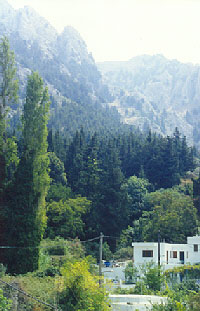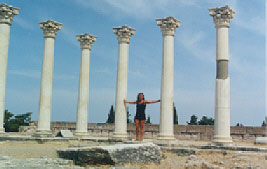|
Kos
Island
Area: 290 sq km (111 sq mi)
Population: 20.000
 The island
of Kos, is situated in the southeastern part of Greece, in the
Aegean Sea, off the coast of Turkey, and is the second largest
of the Dodecanese Islands. It is about 40 km (about 25 mi)
long and 8 km (5 mi) wide and consists mostly of fertile and
well-tilled plains and partially of hilly country. Farming and
stock raising are the principal occupations of the island, and
grapes, figs, olives, lettuce, tomatos, almonds, wheat,
barley, and corn are the most important crops. Kos contains
many important architectural remains of ancient Greek
civilization. It is thought to be the birthplace of the
physician Hippocrates. The island
of Kos, is situated in the southeastern part of Greece, in the
Aegean Sea, off the coast of Turkey, and is the second largest
of the Dodecanese Islands. It is about 40 km (about 25 mi)
long and 8 km (5 mi) wide and consists mostly of fertile and
well-tilled plains and partially of hilly country. Farming and
stock raising are the principal occupations of the island, and
grapes, figs, olives, lettuce, tomatos, almonds, wheat,
barley, and corn are the most important crops. Kos contains
many important architectural remains of ancient Greek
civilization. It is thought to be the birthplace of the
physician Hippocrates.
The principal town and port of the island, also named Kos, was
an important center for learning during the reign of the
Egyptian king Ptolemy II. A 14th-century fortress erected by
the Knights of Rhodes is here.
Like many of
the Greek islands, Kos has survived its fair share of sieges
and triumphs. Despite Persian and Spartan invasion, rule by
Alexander and his successors and two devastating earthquakes,
the island and its arts and sciences flourished. Kos' native
sons include the painter, Apelles, the Michelangelo of his
time, and Hippocrates, the father of medicine.
Kos complex
past has left its mark: Minarets from Turkish mosques stand
alongside grand Italian mansions and the 15th century Castle
of the Knights of St. John. Today's revelers rock until the
wee hours beside the medley of Greek and Roman ruins in Kos
Town.
 Not only
does Hippocrates have a plane tree named after him (he
allegedly taught his pupils and wrote books beneath its
foliage), but the Archaeological Museum's star exhibit is his
statue. The island's Sanctuary of Asklepeios 4 kilometers west
of Kos Town was dedicated to Hippocrates and drew people in
search of its healing powers from throughout the ancient
world. Not only
does Hippocrates have a plane tree named after him (he
allegedly taught his pupils and wrote books beneath its
foliage), but the Archaeological Museum's star exhibit is his
statue. The island's Sanctuary of Asklepeios 4 kilometers west
of Kos Town was dedicated to Hippocrates and drew people in
search of its healing powers from throughout the ancient
world.
Today,
package tourists in search of sun and sea predominate, filling
the island's hotels and pensions and making Kos
Town one of
the most expensive places in the Dodecanese. If you prefer
quietude, seek out the island's beaches and mountain villages
south and west of town, or visit during the off-season.
|
>> Dodecanese Islands : Astypalea,
Halki, Kalymnos, Karpathos,
Kassos,
Kastelorizo, Kos,
Leros, Lipsi, Nisyros, Patmos, Rhodes, Symi,
Tilos.
|
|